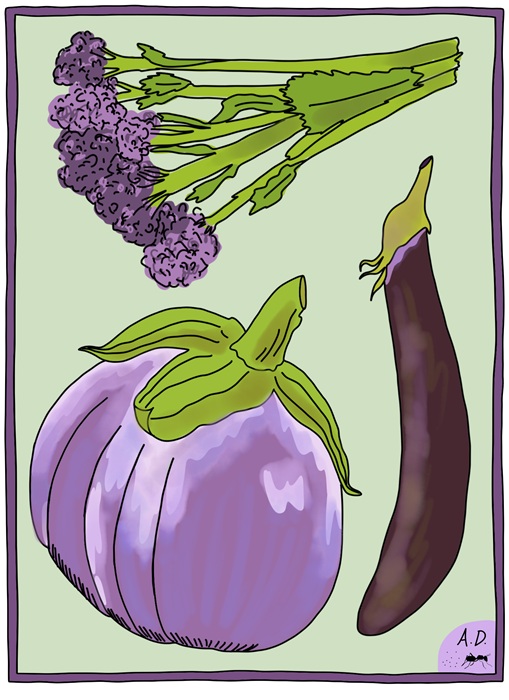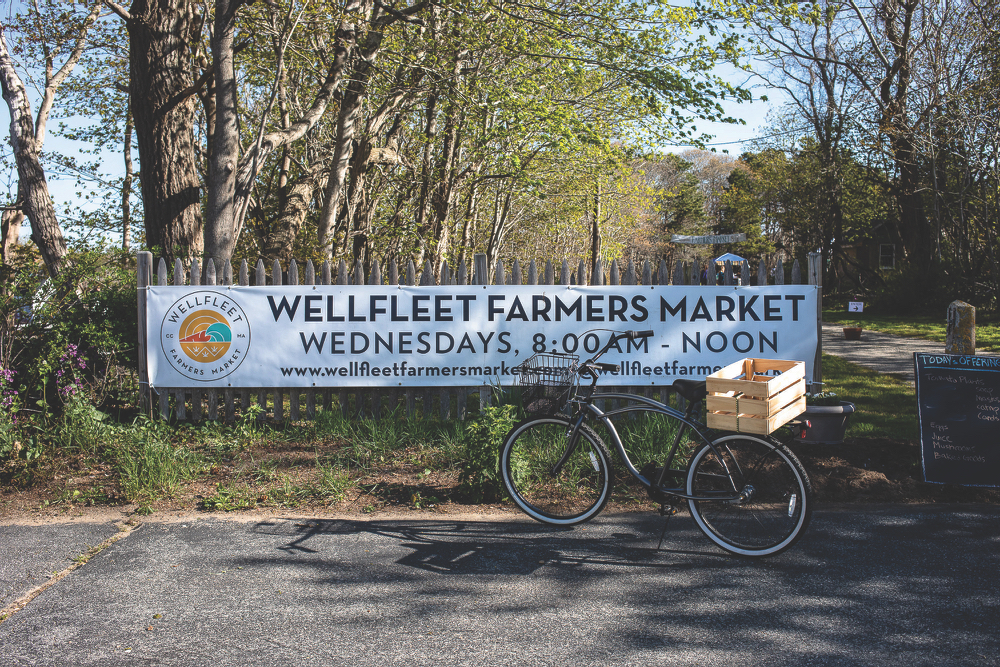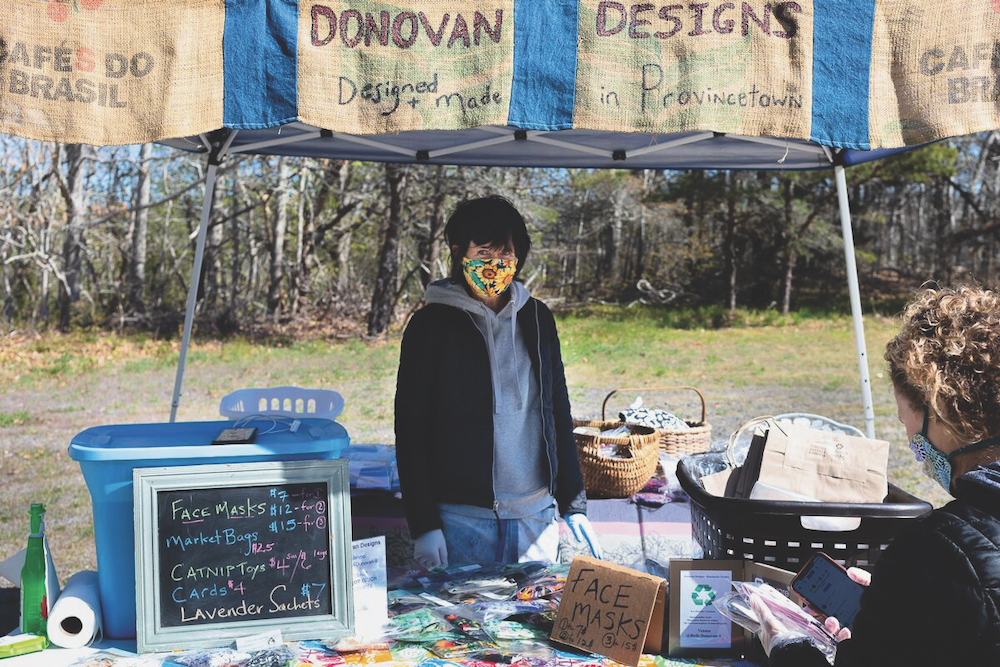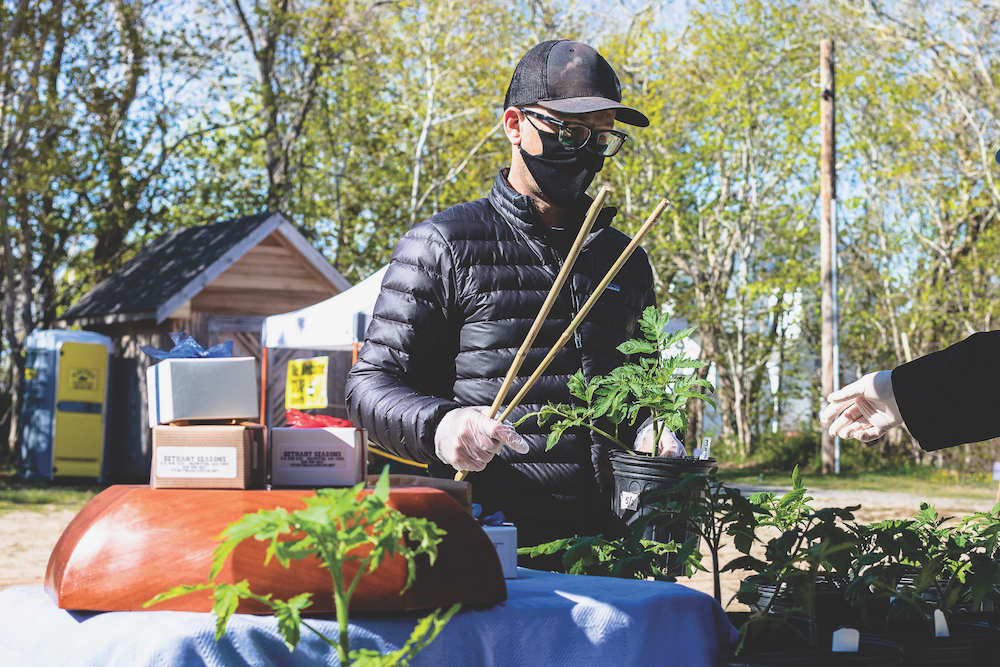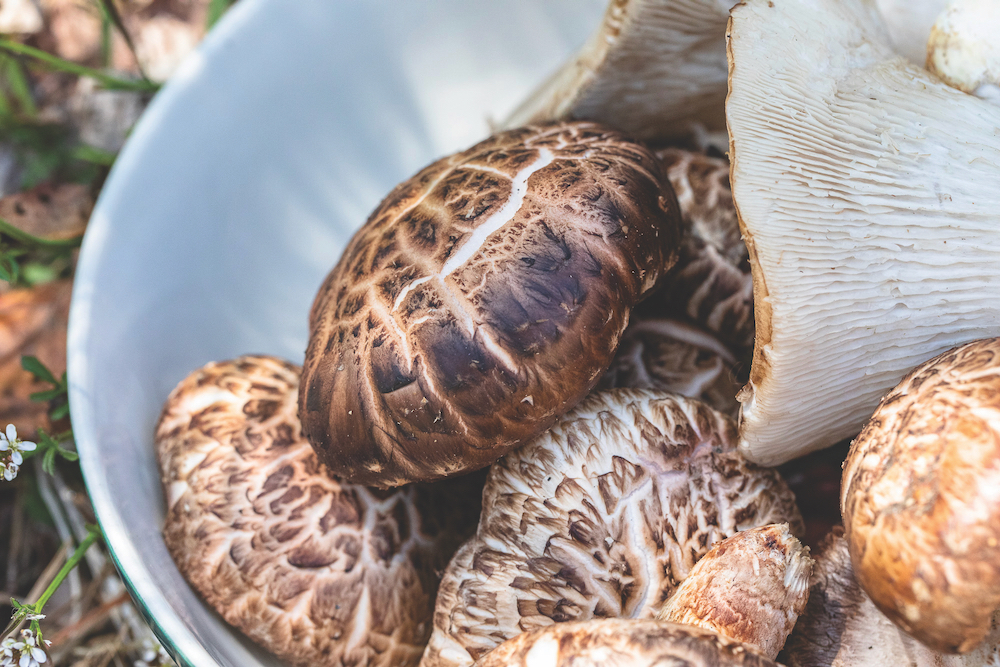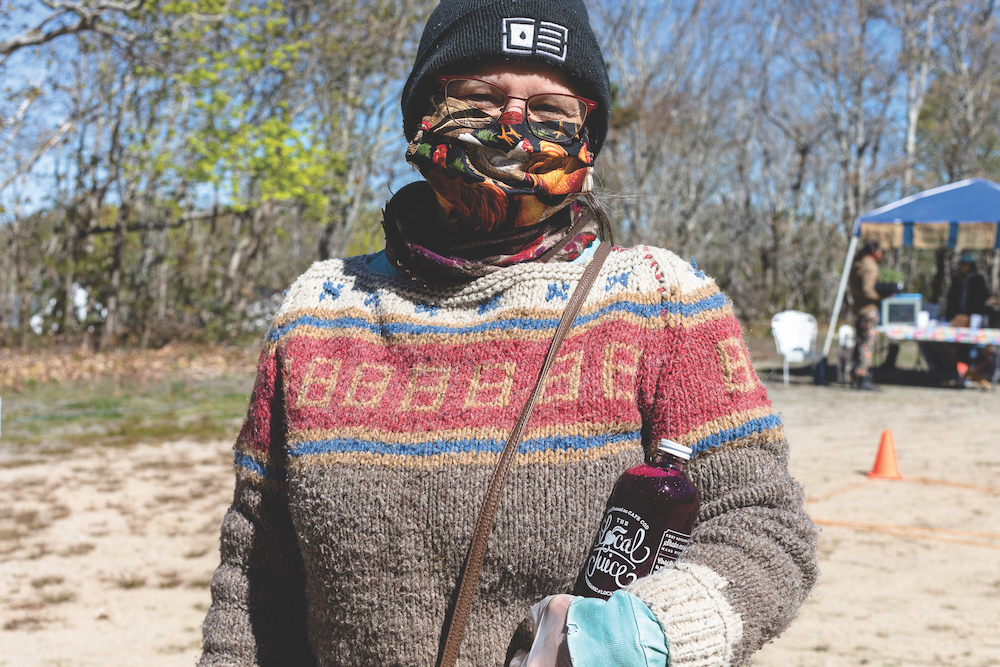Do you go to the farmers market looking for a specific ingredient? Or do you go and see what sparks your interest? What you’re making for dinner can of course lead the way, but this week at the Provincetown Farmers Market something stands out: the great variety of purple vegetables. Brightside Greens has long, thin, deep-purple-skinned eggplants, purple pole beans, and purple broccolini, all grown in Truro by Eric Loscher. Down Home Farm, run by Digree, Bhala, and David Rai is a Truro favorite. They have beefy lavender-hued eggplants, purple cabbage, and purple bunching onions. Dinner this week? Purple.
farmers market
FOUND AT THE FARMERS MARKET
Squashes Beloved and Baffling
July 16
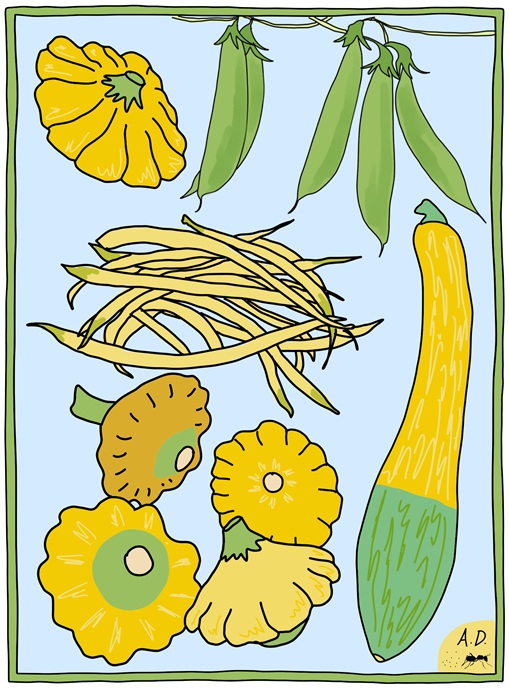
Wellfleet
With the blowing of the conch shells, the farmers at the Wellfleet market are open for business. Rebecca Scanlon of Pleasant Lake Farm in Harwich recommends the yellow wax beans, the lingering snap peas, and the radishes that she re-seeds and grows all season long. Nestwood Farm is the place for summer squash right now with several specialty varieties. “Zephyr” is a beautiful two-tone: half pale yellow, half light green. “Golden Glory” is a bright sunflower yellow with a green stem, and of course there is the beloved pattypan: delicious to eat and baffling to cut.
FOUND AT THE FARMERS MARKET
Sunflowers Rising
June 28-29, 2025
Wellfleet and Truro
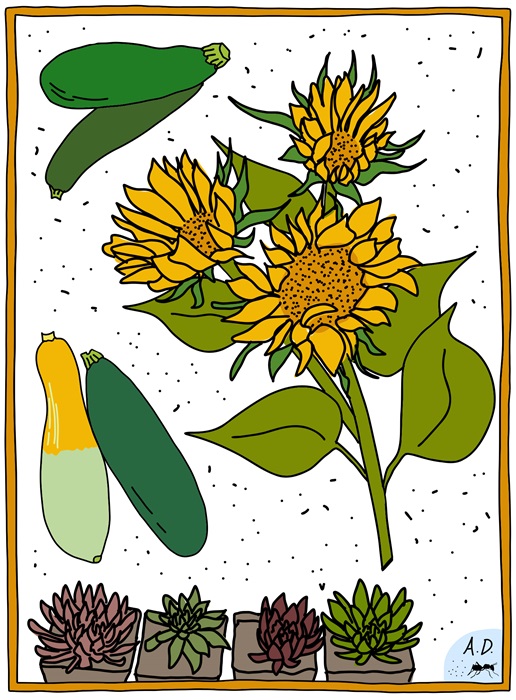
If you’ve just missed the farmers market, try exploring some of the local farm stands. Sea and Soil Botanical Designs (Pole Dike Road, Wellfleet) has bouquets large and small, including the very first sunflowers of the season. Longnook Meadows Farm (Longnook Road, Truro) has early cukes and summer squash — zucchini bread plans are already forming. Down Home Farm (Truro Center Road, Truro) will provide you with every kind of green for your salad: kale, chard, lettuce, bok choy, arugula. And try Kane Farm (corner of Depot and Hatch Roads, Truro) for succulents, basil, marigold, and zinnia plants to add to your garden.
TRURO: THIS WEEK'S CURRENTS
Farmers Market Safety
Most meetings in Truro are remote. Go to truro-ma.gov and click on the meeting you want to watch. The agenda includes instructions on how to join.
Friday, May 6
- Concert Committee, Public Library, 9 a.m.
Monday, May 9
- Bike and Walkways Committee, 6 p.m.
Tuesday, May 10
- Annual Town Election, 7 a.m. to 8 p.m., Community Center
- Council on Aging Board, 9 a.m.
Wednesday, May 11
- Cemetery Commission, Town Hall, 9 a.m.
- Planning Board, 5 p.m.
Conversation Starters
Farmers Market Safety
Truro Center Road has been on the radar of the Dept. of Public Works as an area that presents some traffic safety concerns, DPW Director Jarrod Cabral told the select board during a discussion on April 26. The engineering firm GHD offered the town some preliminary safety recommendations for the area that may serve as traffic calming measures. The consultants suggested installing granite curbing or rumble strips at Truro Center Road and Castle Road, to better define the parking areas.
But Cabral had reservations about pursuing these more permanent improvements with the culvert on Truro Center Road needing a replacement in the near future. Instead, his staff suggested more temporary measures, such as installing tubular delineator posts and removable crosswalk signs.
The select board supported temporary safety measures as a first step, though member Sue Areson said she found the delineators to be “pretty ugly.” Nevertheless, she agreed that “it doesn’t really make sense for us to do something that might have to be dismantled.”
Bob Weinstein, the board chair, asked, “How much of this effort can move forward in the near term to protect the attendees of the farmers market? As we know, this is a very highly trafficked area seasonally.” —Jasmine Lu
SUSTAINABILITY
Farmers Find New Ways to Grow
Local markets gained ground during the pandemic; now farmers look to hold it
TRURO — When the pandemic hit and restaurants closed, Uli Winslow, a mushroom farmer in Truro, expected his sales to take a nosedive, and for good reason: about half of his business was selling to restaurants on the Outer Cape, and they were closing left and right.
But, to his surprise, his sales held steady — thanks to the local farmers markets, his other main source of business. Winslow sells mushrooms at the markets in Truro, Wellfleet, and Orleans.
During last year’s pandemic summer, farmers markets were among the few local businesses that thrived. So far this summer, demand seems to be even higher, leaving farmers and organizers wondering if they can keep up.
Alyssa Staker, the Wellfleet Farmers Market manager, said she saw a rise in visitors and vendor sales last summer. It was one of their best years ever. The Truro and Provincetown farmers markets, which are both run by the nonprofit Sustainable CAPE, experienced similarly strong seasons, according to Founding Director Francie Randolph.
Sales at the Brewster Historical Society farmers market tripled, according to Sadie Hill, who manages the market and is working to establish one in Eastham.
Market organizers are now trying to assess what made it possible for them to succeed in a season when nearly all aspects of the Outer Cape’s economy were depressed, and hoping to use what they learn to plan for the future.
Early in the pandemic, the markets had an immediate advantage over traditional stores simply because they operate outdoors, where risk of contracting Covid-19 had been shown to be much lower — even nonexistent. Staker said people just felt more comfortable at the farmers market than at big indoor grocery stores.
The pandemic also made consumers aware of the fragility of national supply chains, and that brought new attention to locally sourced food.
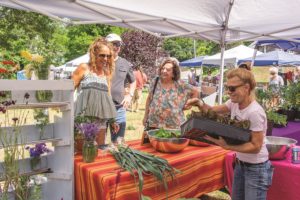
“When you can’t get toilet paper, the next thing you think you’re not going to get is your tomato,” said Stephanie Rein, who runs Out There Organics in Truro and sells at the town’s farmers market.
Still, the farmers markets had to make changes to stay operational during the pandemic. In addition to PPE, distancing, and cleaning measures, Sustainable CAPE markets added a system that allowed buyers to order and pay ahead of time, Randolph said. Sustainable CAPE also became a Mass. Healthy Incentive Program vendor, which allows SNAP recipients to buy more from participating farmers markets. (Now markets in Provincetown, Truro, and Wellfleet all have HIP certification).
The online ordering and HIP certifications are here to stay, according to Randolph.
The Brewster market switched to delivery services, bringing food boxes to people’s homes, said Hill. Farmers did “exceptionally well,” she added, because they knew exactly how much to produce each week, which reduced waste. Brewster is back to a regular in-person market, but Hill said she’d like to bring what she learned about using a delivery service to Eastham when a market is up and running there.
Enthusiasm for local produce that emerged during the pandemic seems to have carried to the new season, at least according to early indicators. Randolph said on the first day the Truro farmers market was open, which was June 14, sales were triple what they had been in previous years.
Can Sustainable CAPE’s vendors keep up with the high demand? “We hope so,” Randolph said.
“I’m kicking butt at the farmers markets,” said Drew Locke, who owns and operates Hillside Poultry Farm in Truro and sells his product at the Orleans market. Part of his success has been driven by customers buying more than before — some regulars who used to purchase a single chicken are now buying two or three per visit, he said.
But, Locke said, it’s hard to react to rising demand in real time. His chickens take about eight weeks to mature — if he wants to raise more to respond to a hot market, he won’t be able to sell them until two months later.
There are other limiting factors, too: production, killing and cleaning the birds, is a bottleneck, and Locke said he has had trouble finding workers to lighten the load. On top of that, Locke has a family to take care of — days before Father’s Day he had to skip production because of the birth of his son.
“I’m not getting much sleep,” he said. “But people are still asking me, ‘Where are the chickens? Where are the chickens?’ ”
Demand this season, said Uli Winslow, has been “more than I can keep up with.” As a result, he has hired someone to sell his mushrooms at the farmers markets, at least some of the time, so that he can have more time for tending to production. Given the labor shortages in the service industries, Winslow feels lucky to have found any extra help.
Rein said her sales have doubled so far this year. She anticipated a big season, so she planted more. She also tried to be strategic — planting crops she doesn’t think others will be selling at the market, such as purple peppers and yellow cucumbers.
Randolph knows growth is not easy for small producers, but she’s optimistic about it. After all, she said, farmers markets are “business incubators” — each dollar spent there reverberates through the local economy.
GROWING SEASON
Farmers Markets Are Back, for Food and Connection
Pre-ordering online helps with needed distancing
After a pre-season full of uncertainty and adjustment, welcome seeds of normalcy are sprouting at the Provincetown and Truro farmers markets, though at both, new restrictions and guidelines have reconfigured what the markets look like and how they work.
The market in Provincetown, which opened on Saturday, June 13, has a new name this year, too. It’s officially the Provincetown Educational Farmers Market, a counterpart to Truro’s, with both now managed by the nonprofit Sustainable CAPE. The market in Truro opened Monday, and for this year, at least, has a new location: the Truro Central School.
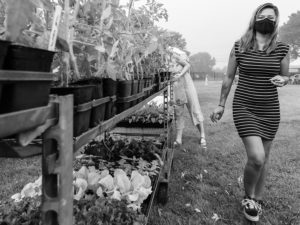
In both towns, new guidelines are meant to keep vendors and shoppers safe, explained Hannah Oakland, who manages Truro’s market. That’s why “we won’t have any live music this year, at least not yet, and we won’t be able to hold as many kids’ events,” she said. Per state guidelines, visitors must wear masks at the market, so there will be no ready-to-eat unpackaged food like coffee or pastries — everything will be sold to go. Both markets have also invested in new signage and hand-washing stations.
A nationwide interest in reopening farmers markets has meant an impressive rallying of market coalitions, strengthening ties between our own local markets and those across the state, according to Oakland. “We’ve been on weekly calls with the commissioner of agriculture,” she said. “Everyone’s been making these decisions together.”
Provincetown’s market got off to a cautious start, initially limiting shopping to online pre-orders only, via Sustainable CAPE’s freshly launched website, shoplocalfood.org. That allows produce to be packed up and ready to go before customers enter the setup of stalls and booths on the town hall lawn. Shoppers need only to find their vendors and collect their ready bundles.
The pre-order only and strict one-way rules were loosened this week by Provincetown market manager Jess Drake Cook. While shoppers are still encouraged to order ahead, browsing is now permitted.
“Having one market under our belt, I felt confident about opening it up more,” Cook said. “A queue at the entrance, limiting the number of people in at one time, and keeping the vendor booths a certain distance apart from one another” are added precautions, she said.
The market is as much about community as it is about the food, Cook said. Even though state-imposed restrictions on the numbers of people gathered will reduce in-person time with vendors, “when you come to pick up your stuff, you still see the vendor you buy from. We’re still connecting with each other,” she said.
Truro’s market is also set up as a hybrid market; as in Provincetown, pre-ordering online at shoplocalfood.org streamlines things, but in-person browsing is allowed. This is largely thanks to the market’s move onto the school property, a preventive measure against the foot traffic and crowds that built up in the center of town at the market’s usual location.
One of the big concerns about the markets’ plunge into online ordering was finding a way to continue the Supplemental Nutrition Assistance Program (SNAP), also known as food stamps. SNAP card pin numbers cannot be used online.
But the website has a new feature that Sustainable CAPE Executive Director Francie Randolph says solves that problem. Shoppers who select SNAP as a method of payment on the site will be able to finalize their purchases in person when they collect their goods on market day.
Cook says she is relieved about the fix. “We wouldn’t have gone forward with the pre-order system if it wasn’t going to work for everyone,” she said.
The online system has so far been successful enough that market managers are considering its continuation in a post-Covid reality. “Our biggest concern was straying too far from the original farmers market,” said Oakland. But if it turns out that going online bolsters market access for even more people, it might be here to stay.
Pre-ordering online for the Provincetown Farmers Market is available from Wednesdays at 5 a.m. to Thursdays at 5 p.m., with pickup during market hours, Saturdays from 9 to 11 a.m. in front of town hall.
Pre-ordering online for the Truro Farmers Market is available from Fridays at 5 a.m. to Saturdays at 5 p.m., with pickup during market hours, Monday from 8 a.m. to noon at Truro Central School.
CURRENTS
This Week in Truro
Meetings Ahead
Meetings are held remotely. To watch live, go to truro-ma.gov and find meetings on the lower right of the home page. Click on the agenda of the meeting you are interested in and follow directions within each agenda. To view meetings after they have occurred, go to the town home page, scroll down under News & Announcements, click on “Remote Meeting Information,” and follow directions there.
Thursday, May 28
- Select Board, 2 p.m.
Monday, June 1
- Conservation Commission, 2 p.m.
Wednesday June 3
- Board of Health, 2 p.m.
- Planning Board, 6 p.m.
Conversation Starters
Coronavirus Update
As of May 22, there were zero active cases of Covid-19 in Truro, and 10 resolved cases.
Agreement on Short-term Rentals?
On May 28 at 2 p.m. the Truro Select Board will consider two questions about short-term rentals posed by Eastham Select Board Chair Aimée Eckman. She seeks input from select board members from Brewster, Chatham, Provincetown, Truro, Orleans, and Wellfleet, according to the May 28 meeting agenda.
Eckman is asking if each board would like to see a minimum stay for short-term rentals this year. And if boards can agree on that, what would the minimum number of days be: 7, 14, or 28 days?
The results of this survey will be forwarded to state Sen. Julian Cyr and Rep. Sarah Peake, to guide policy as part of the county’s reopening plans. Cyr and Peake have advocated for consistent policies throughout the region.
Farmers’ Market Time?
Sustainable CAPE founder Francie Randolph is seeking permission to use town property to begin the Truro Educational Farmers’ Market on June 8. The select board will discuss the request on May 28.
The market usually draws about 400 people and is held from 8 a.m. to noon on Mondays through Aug. 31, according to the application. A delay of the June 8 opening will affect farmers’ incomes as well as SNAP (food stamps) card holders wishing to access fresh food locally at a discount, according to the application. The farmers’ market is the only SNAP-eligible food provider in Truro.
Town Meeting Date
Town staff will ask the select board at its 2 p.m. meeting Thursday to delay the town meeting from June 23 to Sept. 15, according to the agenda for that meeting.
After reviewing the idea of holding town meeting outside or using technology to allow for “satellite meeting spaces,” Town Manager Rae Ann Palmer stated there doesn’t appear to be a safe and effective way to hold town meeting in June. She also ruled out limiting the warrant articles to financial matters. In the end, she will recommend on May 28 that the town meeting be postponed.
Under the emergency regulations imposed by Gov. Charlie Baker, towns can spend one twelfth of their 2020 fiscal budget each month until a new fiscal year 2021 budget can be approved by voters.
All other Outer Cape towns have already delayed town meeting until the fall: Provincetown’s is Sept. 21, Wellfleet’s is Oct. 5, and Eastham’s will be either Sept. 21 or Sept. 28. —K.C. Myers
FARMERS MARKET
Opening Day in Wellfleet
Shoppers and farmers reconnect in quiet joy
Photos and text by Edward Boches
It was a windy but gloriously sunny opening day at the Wellfleet Farmers Market last Wednesday, May 13. Shoppers and vendors alike wore masks, but there were smiles behind them as people expressed their relief at the chance to reconnect. Signs guided marketgoers on healthy shopping rules — masks, gloves, distance, no reusable bags. And arrows marked the way to juices and herbs, mushrooms and masks, eggs, baked goods, and tomato seedlings, poised to grow.
A bicycle waits while its owner shops on a cool, quiet first market morning.
Beth Donovan has added brightly colored masks to the array of textile designs she sells.
Thomas Hoeffgen of Wellfleet gets a tomato seedling along with instructions for how to plant it from Vivian Dortora of Bethany Seasons.
Uli Winslow of Cape Coastal Farm Products brought his mushrooms from Truro.
Beet juice from the Local Juice made Wellfleet shopper Deb Giza smile.
ENVIRONMENT
Permaculture Expert Teaches How to Grow Food in Our Forests
Kids and adults learn how agriculture can restore ecosystems at Nauset H.S. garden
EASTHAM — Restoration Agriculture author Mark Shepard of Wisconsin visited the Nauset Food and Research Garden at Nauset Regional High School last week to speak with about two dozen community members on agroforestry.
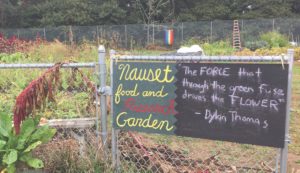
Shepard is well known in permaculture circles for his pioneering vision of perennial agriculture and advocates using trees to grow staple crops rather than annual plants.
“Our food is the primary cause of ecological destruction,” Shepard told the audience. “We take full complete living ecosystems where all of our needs could be met, destroy them, wash the soil out to sea, and then do it again the next year.”
In the early 1990s Shepard began studying how to grow food to restore ecosystems instead of destroying them. Inspired by the book Tree Crops by J. Russell Smith, he purchased 110 acres of former cornfield in Wisconsin and converted them to a perennial farm where he mimics the layers of a natural ecosystem, but with plants selected for food production.
“Start by identifying the biome of the region where you’re growing,” Shepard explained. (Cape Cod is dominated by scrub oak shrubland.) “The oak is coloring everything, so it’s got to be compatible with oak or it won’t grow well.” The Fagaceae family includes oak, chestnut, and beech trees, all of which produce large edible nuts. Species that are compatible with these trees and that can be grown in lower layers of a Fagaceae-dominated food forest include apples, hazelnuts, plums, cherries, peaches, raspberries, blackberries, grapes, currants, and many species of edible fungi.

The event was sponsored by the Orleans Farmers Market and the Food Forest Initiative of Cape Cod, which co-manage the Nauset Food and Research Garden located at the high school.
“I met Mark at a permaculture workshop in Colorado in 1992,” said Food Forest Initiative member Rand Burkert. “We were both reading Smith’s book on tree crops, and I got involved with starting his farm in Wisconsin.”
Burkert organized Shepard’s talk at the garden as well as a meeting between the author and environmental studies students at Sturgis West in Barnstable and a workshop on the grounds of the Harwich Water Dept. to examine a public right of way under the power lines for restorative agriculture design.
Burkert helped garden founder Gretel Norgeot reinvigorate the plot at the high school after it sat fallow for two seasons, and it reopened this year with a new mission.
“I want the garden to reflect different approaches to growing food, to be a laboratory for ideas, and a place for getting hands on sustainability and ecology experience in high school,” Burkert said. “I’m currently working on writing some small grants to try to get worm composting and chickens into the space, so that we can start to process food scraps and build soil fertility.”
Burkert is also in the process of starting a student garden club and plans to add a small outdoor library with books like Shepard’s Restoration Agriculture and other permaculture titles.
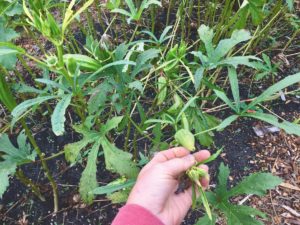
Norgeot said she was inspired by Shepard’s talk and was excited to see several students and a home-schooling family that have been heavily involved with the garden in the audience.
“I respect what people did a couple weeks ago for the climate crisis, taking to the streets,” Shepard told attendees in closing. “But that doesn’t cut it. We need to make real changes and solve real problems for real people, and we need to do it yesterday. Let’s go to the clear cuts, the abandoned farms, and let’s plant it all with food. Let’s transform this world using its own playbook, using the species and processes it’s used forever.”
